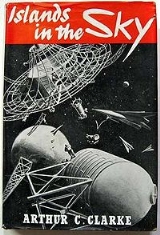
Islands in the Sky
Encyclopedia
Islands in the Sky is a science fiction
novel written by Arthur C. Clarke
, and published in 1952. It is one of his earliest and lesser known works.
The book tells the story of Roy Malcolm, a young space enthusiast who wins a trip to the Inner Space Station by way of his knowledge of aviation
on a game show. Once aboard, Roy learns the effects of zero-G with delight, and joins the mishaps and adventures of the young crew of the station.
Throughout the book, there are small hints given suggesting life on other planets within the solar system, but seemingly these forms of life are unintelligent. For instance, Commander Doyle of the Inner Space Station recounted a story of so-called "Mercurians
" living in the sunless and "twilight" regions of the planet. Also, at the end of the book, a photograph is seen by Roy of small, gentle native inhabitants of Mars
, supposedly friendly to human beings after their colonization there.
One other notable aspect of this novel is that the setting provides a fictional example of Clarke's concept for the geostationary
communications satellite. In the novel, there are three large manned orbital stations set up in a triangular formation around the Earth that provide telecommunications for the entire surface. This closely mirrors Clarke's original model of satellite arrangement.
and McComas
praised the novel as "a detailedly plausible and accurate fictional tour.".
Science fiction
Science fiction is a genre of fiction dealing with imaginary but more or less plausible content such as future settings, futuristic science and technology, space travel, aliens, and paranormal abilities...
novel written by Arthur C. Clarke
Arthur C. Clarke
Sir Arthur Charles Clarke, CBE, FRAS was a British science fiction author, inventor, and futurist, famous for his short stories and novels, among them 2001: A Space Odyssey, and as a host and commentator in the British television series Mysterious World. For many years, Robert A. Heinlein,...
, and published in 1952. It is one of his earliest and lesser known works.
The book tells the story of Roy Malcolm, a young space enthusiast who wins a trip to the Inner Space Station by way of his knowledge of aviation
Aviation
Aviation is the design, development, production, operation, and use of aircraft, especially heavier-than-air aircraft. Aviation is derived from avis, the Latin word for bird.-History:...
on a game show. Once aboard, Roy learns the effects of zero-G with delight, and joins the mishaps and adventures of the young crew of the station.
Throughout the book, there are small hints given suggesting life on other planets within the solar system, but seemingly these forms of life are unintelligent. For instance, Commander Doyle of the Inner Space Station recounted a story of so-called "Mercurians
Mercury (planet)
Mercury is the innermost and smallest planet in the Solar System, orbiting the Sun once every 87.969 Earth days. The orbit of Mercury has the highest eccentricity of all the Solar System planets, and it has the smallest axial tilt. It completes three rotations about its axis for every two orbits...
" living in the sunless and "twilight" regions of the planet. Also, at the end of the book, a photograph is seen by Roy of small, gentle native inhabitants of Mars
Mars
Mars is the fourth planet from the Sun in the Solar System. The planet is named after the Roman god of war, Mars. It is often described as the "Red Planet", as the iron oxide prevalent on its surface gives it a reddish appearance...
, supposedly friendly to human beings after their colonization there.
One other notable aspect of this novel is that the setting provides a fictional example of Clarke's concept for the geostationary
Geostationary orbit
A geostationary orbit is a geosynchronous orbit directly above the Earth's equator , with a period equal to the Earth's rotational period and an orbital eccentricity of approximately zero. An object in a geostationary orbit appears motionless, at a fixed position in the sky, to ground observers...
communications satellite. In the novel, there are three large manned orbital stations set up in a triangular formation around the Earth that provide telecommunications for the entire surface. This closely mirrors Clarke's original model of satellite arrangement.
Reception
BoucherAnthony Boucher
Anthony Boucher was an American science fiction editor and author of mystery novels and short stories. He was particularly influential as an editor. Between 1942 and 1947 he acted as reviewer of mostly mystery fiction for the San Francisco Chronicle...
and McComas
J. Francis McComas
Jesse Francis McComas was an American science fiction editor. McComas wrote several stories on his own in the 1950s using both his own name and the pseudonym Webb Marlowe....
praised the novel as "a detailedly plausible and accurate fictional tour.".

